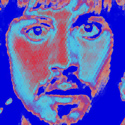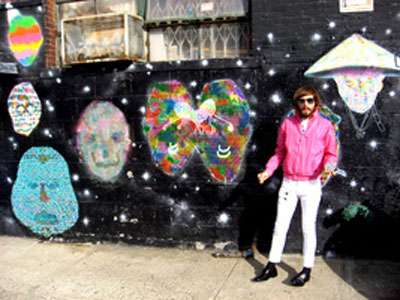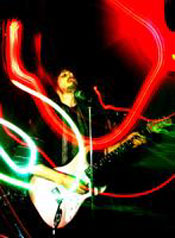
Pop Levi
The Process of Pop
S.D. Green
“Pop” is a complex term. A litany of current indie artists have a strained relationship with “pop music,” as it is a lightning rod for criticism, ridicule, and confusion at the same time that it can be a source of inspiration and represent the collective creative energies of the people. A pop song, in many ways, is a three-minute distillation of the failures, foibles, and fantasies of the culture within which it is created – usually wrapped up in a package pleasing to the kiddies. In this regard, both Elvis and Britney are pop, as is everything from Puffy to the Pet Shop Boys. British-born Pop Levi (nee Jonathan Pop Levi, so it’s not a put-on) is not shy about naming his music after himself. However, as a former member of the inexplicable Super Numeri and cutesy Ladytron as well as a precocious solo artist, his output covers a cross-section of styles. His first release, The Return to Form Black Magick Party, has been evaluated by some critics as a re-tread of glam. He has since moved to L.A. and found inspiration in a completely different, more synthetic, sound on his new release, Never Never Love. Talking with him on the phone reveals a unique, thoughtful, creative being whose inspiration exceeds the weak descriptors put on his music. On the eve of his first film’s November 24 U.S. release, You Don’t Gotta Run, we discuss non-synesthetic musical “smells,” Tamagachis in love, and the state of his namesake: Pop.
• •
I heard it was just your birthday. What did you do? Anything music related?
I made some. Have you seen the Belkin Tune Talk microphone? It’s about the size of your thumb and you stick it into the end of your iPod. It has the most amazing sound. It’s designed for dictaphone use, you know? But if you place it in the middle of a well-thought-out room then you can make some amazing sounds. I’m making some tracks that I’m going to be using for a soundtrack for one of my films I’m making next year.
You just finished working on your first film, right?
Yeah, my company, World Empire Inc, just produced a 37-minute piece called You Don’t Gotta Run, which we’re gonna premiere at the Montreal Nouveau Cinema Festival next week. It’s a surrealist montage of the kind of candid moments you would never want to put in a film, and purposely putting these things back-to-back and choosing the most stylish moments.

Do your films have a narrative?
Well, the first one is called a documentary so it doesn’t have a narrative. That theme [doesn’t] necessarily carry on through but it might do. One idea is like blurring the lines between what’s documentary and what isn’t. It’s easier to do with that style of film making ‘cause it all kind of looks bad quality anyway so you can disguise what’s going on and make documentary look like drama and vice versa.
Which filmmakers would you jump at the opportunity to do a soundtrack for?
Uhm… Werner Herzog, he’s my favorite film director or certainly one of them. My dream would be to make a film as good as his, rather than to make the music in his film, but I would still do it if the chance came. I’d do the music for a Tarantino movie. It would be silly not to, wouldn’t it? I’m hoping to meet him, actually.
After the premiere of You Don’t Gotta Run are you going to put it on DVD?
Maybe. I think I’m going to build a Web site around it. If I put it on DVD, nobody will buy it and I’ll lose loads of money. If I give it away free, online, then lots of people will see it and I can make another one then.
So what are you putting out next?
I’m putting together a new live show. I’m really excited about that and I’m hoping to release a double album of alternate takes and music that was made around the recording Never Never Love that was never released, so I’m editing and putting some of that stuff together. Hopefully within the next six months or so. Other than that, I’m making a follow-up to You Don’t Gotta Run already, a film, and I’m making a soundtrack to that too. They’re all going to be 37 minutes.
Are there any artists you’re working with in L.A? Any musicians that you’ve met since you’ve been out there?
Well, I live with the rest of the people that are on my World Empire Inc. team which is [Lucky] Beaches, who plays bass in my group and on recent recordings. I’ve been living with these two girls, Auntie Mum and Sanchez, and they’re real characters. All four of us have been making recordings in all sorts of places – like going to Malibu and making recordings on the ocean and then getting back and cutting and splicing them.
How would you describe your sound?
It’s a pretty broad spectrum, broader than genre. All the music that I’m involved with is either music you really get into or you don’t like. It’s really potent. I like strong smells.
You’d use smells as opposed to sounds to describe it, huh?
Well, I mean, in a poetic sense, yeah, but I’m not talking about synesthesia, I just mean something that has a strong taste. I don’t like the idea of making background music unless you were entering the art of background music.
You’ve said in interviews that you wanted Never Never Love to sound like Japanese toys falling in and out of love with each other. How was your approach to this album different than the first, which was more of a rock album? Did you set out to make a more R&B sounding record? A cleaner record?
Yeah, definitely. The first one I made all on my laptop as I was traveling. Made on trains and sometimes in toilets in trains and in my bedroom and in warehouses and it kind of sounds like the way it was made. The second one, [I wanted] to do things differently, and I was listening to different music, and I was a different person, and I had some more money, so I decided to make it all in the same studio where they made Thriller and where Missy Elliot and Timberland make their records… it was a trip, man, total trip to do that. I always wanted to make a record in Hollywood. I wanted some of that feeling in me. If you do anything in a special place, if you’ve deemed it special to yourself then you kind of give yourself a different edge, don’t you?
In a different interview you said you wanted Never Never Love to have a soullessness to it, but the voice is considered to be very soulful. So how did you approach the voice, with that idea of soullessness, did you have a particular idea in your mind of how you wanted to sing the songs?
Yeah, yeah, totally. I wanted it to have that edge in what we would call “soul music” but not to turn it into pornography. Like all of the best bits of Aretha Franklin in one moment, and that kind of shit, I didn’t want to do that. I wanted the editing to be so intense and in detail that all of the human elements were taken out of the music so it was so strict. I wanted it to be like a preset and like a not very good preset, and that’s where the soul comes in. That’s where it’s kind of a bit jarring and a bit wrong.
When you talked about it being like love music for Japanese toys did you actually get into that character?
I like the idea of Tamagachis or that kind of thing in the future having some kind of preset sound. If you chose one of those it would kind of sound like this. Even if you didn’t like the new record I don’t think it sounds like everyday music.
On your previous album a lot of people compared you to the glam rock styles of T-Rex and Bowie. Is that a fair representation of what you were doing?
No, not really, because I don’t think much of that record sounds like what we would call glam, which is like 1970 – ‘73. There are certain things about that music that I like and I use because it’s linked to doo-wop. Someone like Marc Bolan was into making feedback Gibson guitars sound like violins from doo-wop records, distorted; he’s obviously doing that, he’s referencing. [The Return to Form Black Magick Party] sounds more like The White Album than a Gary Glitter album to me… but it’s not as good as The White Album [laughs].
What were some influences you had on the first record and what was influencing you differently on the second record?
I was into listening to R. Kelly when I was making the new record. I really got into R. Kelly last year. You know he leaked his new album and they haven’t released it [but] you can get it online. Two months ago he leaked it and it’s amazing. At least half the record is better than anything by Prince in the last 20 years. I’ve never heard anything like that. He’s fucking outrageous. Really, really weird, obsessive person. Genuine freak.

Any other current popular artists who you like or admire their approach to music?
Yeah, I like this girl from Japan called Miel Fraga. I discovered her on Myspace and she’s got the most bizarre, almost naïve, approach to over-treating her voice on top of electro-folk music and it’s good. I’ve never heard anything like that. Sounds great.
Do you get a lot of music on Myspace or do you go to record stores?
No, I go to record stores. I bought a Hamilton Bohannon record in Amoeba last week, Cut Loose, that’s blowing my mind; fucking amazing, amazing record.
So you’re into that ’70s soul-disco thing?
Disco isn’t my thing, necessarily. There’s just something about Bohannon. Years and years ago, what are they called… Tom Tom Club, you know their song “Genius of Love” with the line [sings] ‘Bohannon, Bohannon, Bohannon, Bohannon’, yeah… I love that song. That’s one of my all time favorite songs, “Genius of Love.” I wish I’d written that. Sounds like being in love; it sounds like beach parties.
I saw in an interview you did where you talked about being into mathematics. To a lot of people mathematics is kind of nerdy and the antithesis of soul, which is considered off-the-cuff and from your gut…
Well, I’m talking about the mathematics of soul.
How do mathematics affect how you approach your music? Do you think about writing in a soulful manner and do you use mathematical concepts to get to that?
I always write in what I would consider a 100% soulful manner but then I treat it with mathematics to lock it into place to where it makes some kind of sense to me. I think that making a recording is one thing and that can be amazing or not, but writing a song which stands on its own in someone’s memory, irrespective of whether they ever heard the song again, that’s something I’m really interested in doing. I’d like to achieve that.
How do you write? Do you sit down with a guitar? Do you write it down or do you keep the music in your head?
No. I never write with any instrument and I never make any effort to write a song, ever. I keep it in my head, at least for a while, so that as bits fall off it it becomes sort of more… like cooking. What is the word when you boil something down?
Reduction?
Oh, reduced, yeah, exactly, yeah, yeah. I dig the idea of a mental reduction of a song. I think that’s why the new record I’ve made sounds very much like that to me. It’s 100% song, very traditional. It’s just: verse/chorus/verse/chorus/bridge/chorus/chorus/end.
How would you describe pop music?
I like Phil Spector’s description of his songs, which is one of the best ones I’ve heard, he said he makes three minute pocket symphonies for the kids. I just thought that’s amazing, that’s like some kind of musical Willy Wonka – which I suppose Phil Spector is, isn’t he? I would describe it… it’s a reduction, isn’t it? Nothing more, nothing less. But the best thing about it, and the best thing about any way of looking at records or films or any worlds, is that you can just get into it and all these worlds open up to you the more you look at it and that’s where the fascination starts.
You’ve described your music as pop. There’s a lot of disdain for pop by some independent artists. Why do you think it’s gotten such a bad name?
I think it’s because of what it’s become. I suppose when I say I make pop music, as some of my records are, it’s, in a way, standing up against that. Because the very idea of it and what it means and the millions of hours of it that are already recorded, just that little idea of something humans have done is undeniably fascinating. Things that we call classic, or the reason we think The White Album is so good is because, in those days, the industry machine just wasn’t as well-oiled as it is now. Obviously, any machine will become so well-oiled that not much gets out of it and that’s pretty much the case of it now. I know how people do number one records and it’s not what I thought when I was a kid.
What do you think about punk, because by your definition of pop, punk would fit because it’s very distilled, it’s very concise.
Well, yeah. Punk is pop music, isn’t it? Sure.
Punk became well known for its D.I.Y. attitude. Now technology has allowed for people to record. They would have had to go to a studio before and now they can record at home. It’s broken down that wall between professional musicians and…
Totally, totally. There is no wall. Everybody doesn’t know what’s happening. It’s also kind of good because for a million dollars or one dollar, everybody knows whether a song makes you wanna dance. Whether it cost Prince one dollar to make “Kiss” or a million dollars, it’s still “Kiss,” isn’t it? There’s a reason why when that gets played all the chicks get up and dance, no matter where you are in the world.

I think it’s hard for some people because they buy into product, because it says something about them. The juxtaposition of where I come from and what I’m into, it’s a kind of identifier. People get into what it means to consume a certain product and it’s cool that we’ve gotten to a point where everyone is producing music and it’s kind of obliterated those barriers. You have to choose for yourself what you like because the line between the product and the individual has been broken down.
Yeah, definitely; nobody is going to do it for you. It’s good and bad. I’m living out exactly what you’re describing right now and that’s doing things all D.I.Y. and it’s something I’ve always wanted to do. And about four years ago it just became affordable, didn’t it? You could get an amazing laptop and amazing digital camera and you can make films and write soundtracks for movies. You can choose who the star is. You can be the star or your best friend. You can really go into doing it as good as someone like Francois Truffaut would have done or Werner Herzog. I mean, it was a miracle when bands like The Monkees managed to make a film or something but, nowadays, I don’t see why bands don’t make one film a year. All their fans would love it.
You know what you were saying about people not wanting to be affiliated with the average or trying to find something that makes them individual in terms of taste? I would argue that any genre that they choose – no matter big or small – whether it’s pop music or Norwegian death metal or whatever, they’re still buying somebody else’s product. So the only way to be truly individualistic is to listen to your own music. Belkin Tune Talk, $59.99! I think that will happen, honestly. I think every human has the desire to be creative. When computers and virtual reality are up to the speed that it can take it, I think every human will be making their own. In the future, people will do everything.
Pop Levi: http://worldempireinc.com ◼












